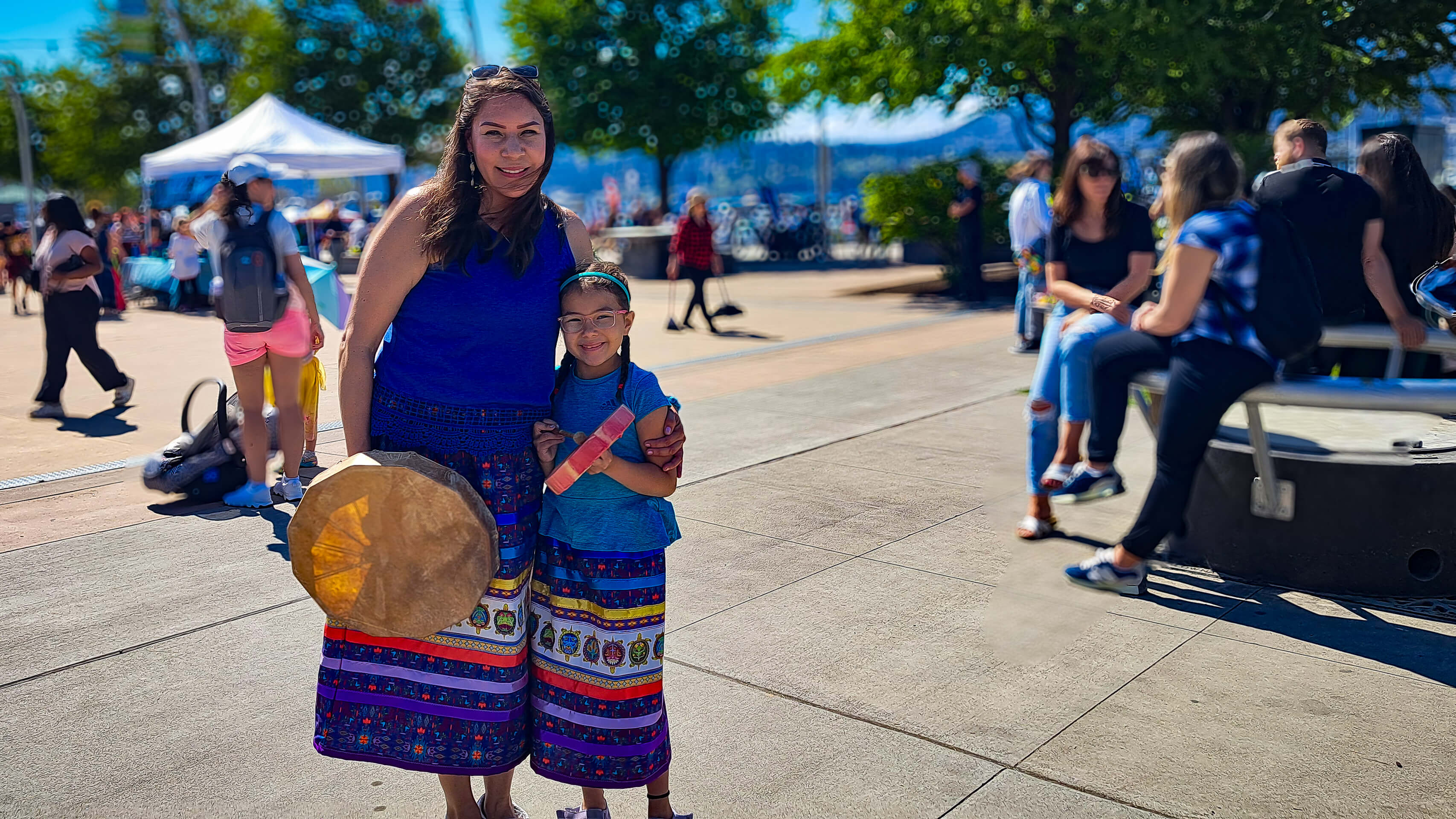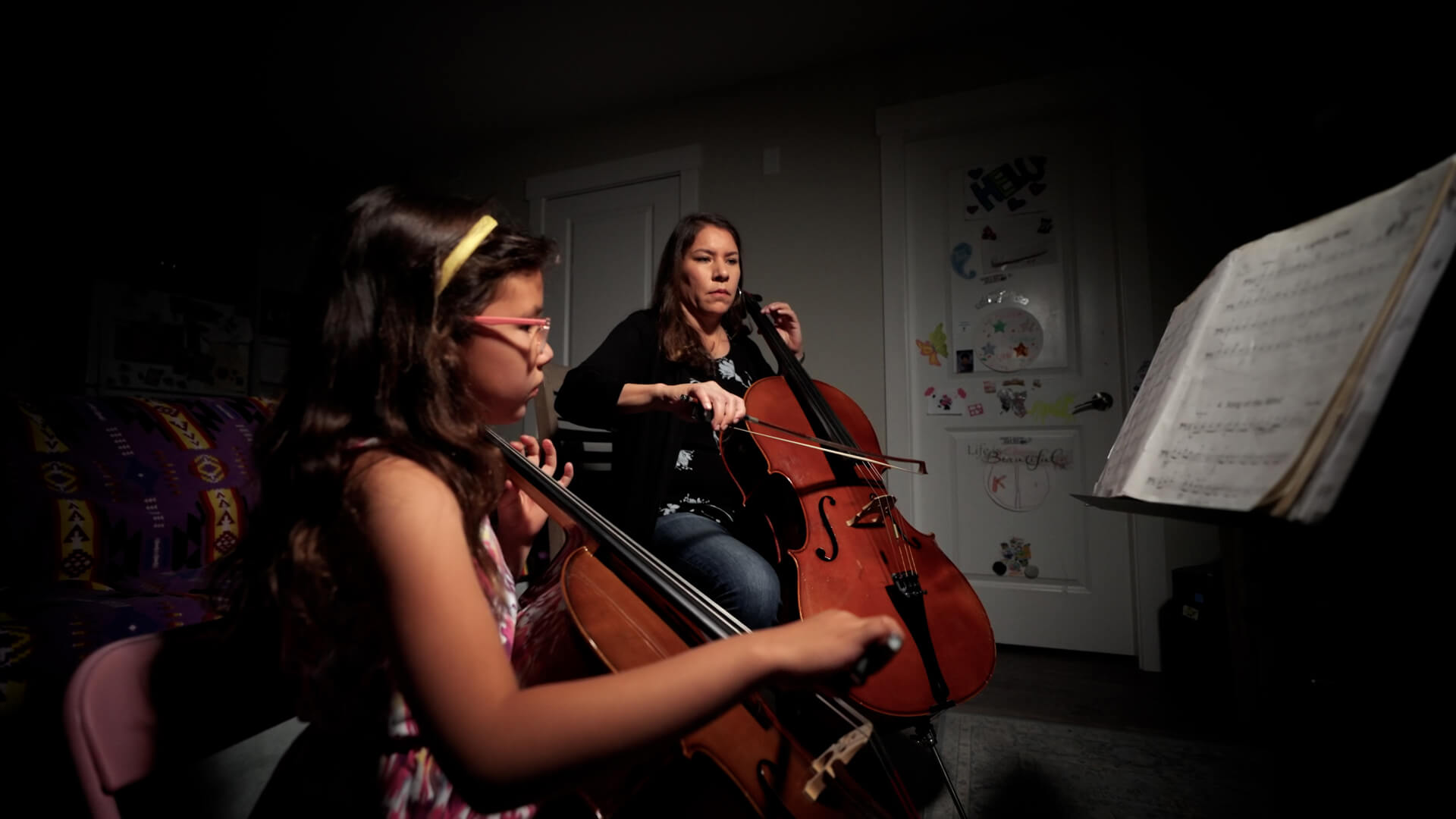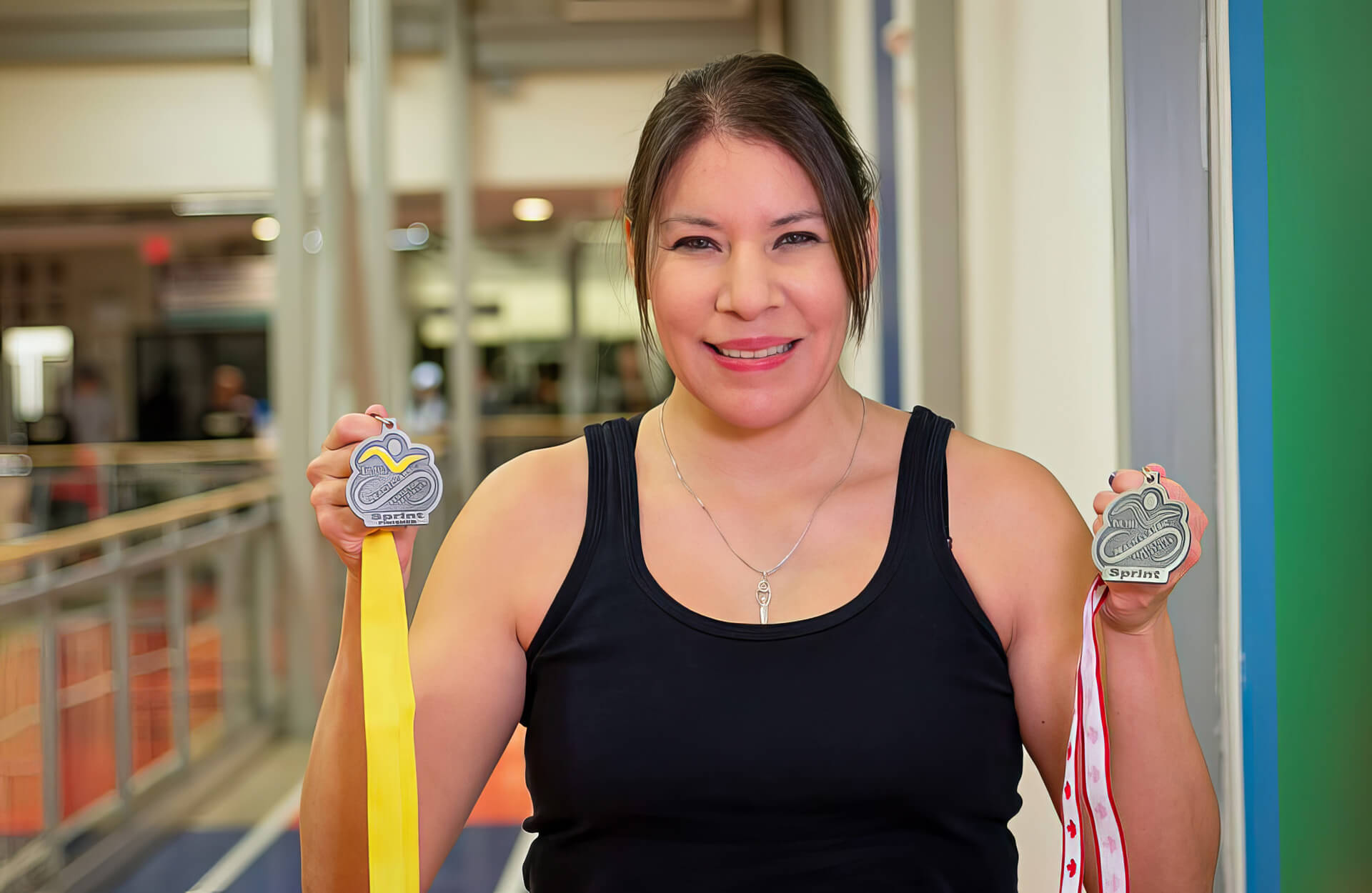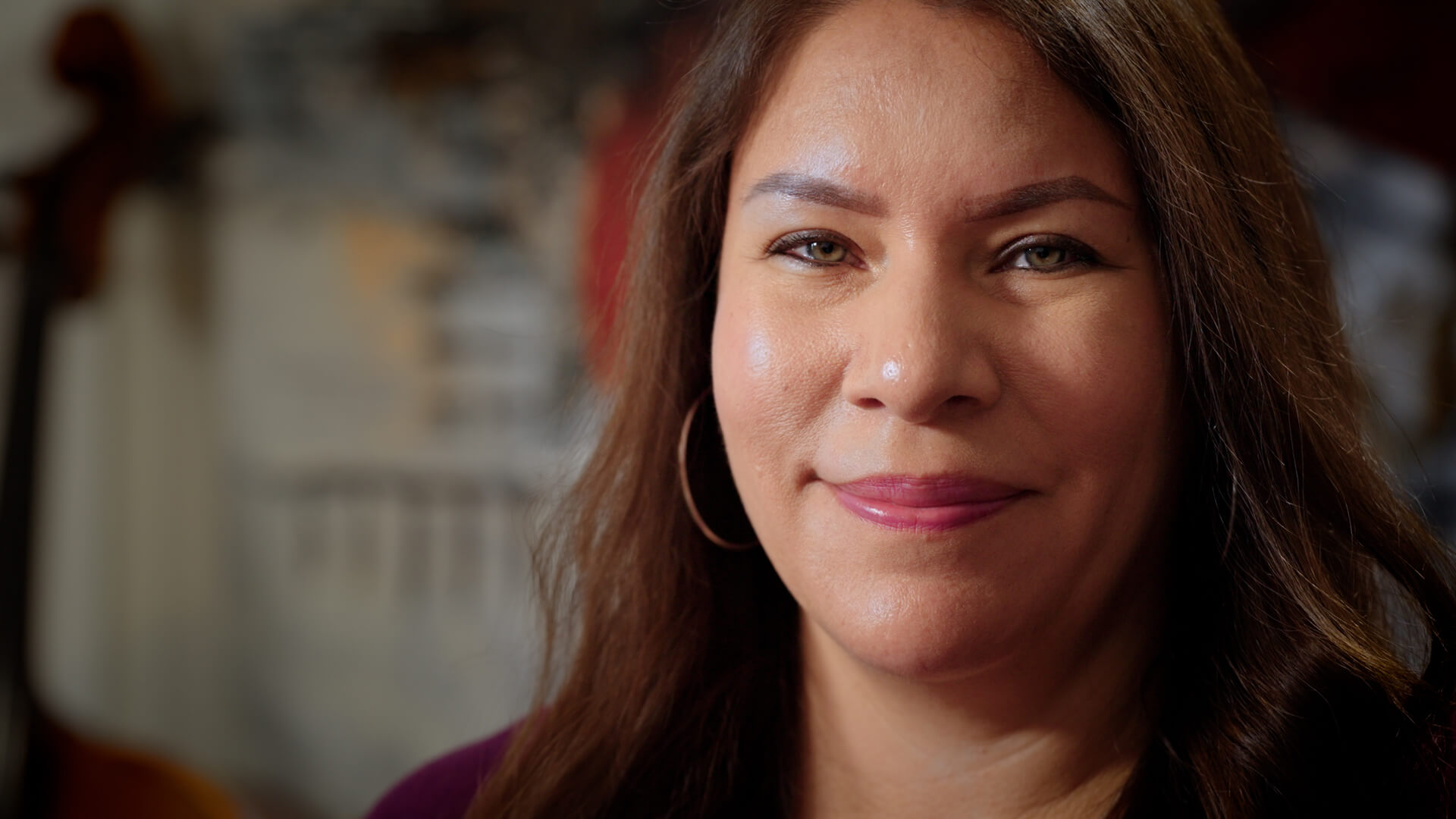Master of Health Studies grad Kethra Stewart hit rock bottom in her 20s. Today, she’s an Indigenous scholar, musician, triathlete, and role model to her daughter.
Every morning for the past five years, Kethra Stewart (Master of Health Studies ’25) has woken at 6:30 a.m. to make breakfast and pack lunch for her daughter, Keira, before rushing out the door to make the daily school drop-off. Once the school bell rings and goodbye hugs are exchanged, Stewart shifts focus from full-time mom to full-time university student.
“When she's at school, I'm at my desk. Even after she goes to bed, sometimes I’m up until 11 or 12 o’clock at night working,” she says.
When she wasn’t studying, the single mom from Saddle Lake Cree Nation who now lives in Kelowna, B.C., was likely busy with other family activities such as teaching Keira cello—a lifelong passion she’s proud to share—or shuttling to and from swimming lessons, ballet, powwow dances, or kung fu. There’s also practices with their local Indigenous drumming group, The Women of Turtle Island. On top of it all, Stewart trains as a triathlete.
In other words, the days are full and evenings are long, but she wouldn’t have it any other way as she strives to create the best life possible for the family.
“Keira inspires me every day. Everything I do is for her.”
Stewart’s life and everything she’s achieved, including the Master of Health Studies degree from Athabasca University she’s set to celebrate at Convocation on June 5, would be unrecognizable to her younger self. At her lowest, she found herself alone due to drug and alcohol addiction.
The decades in between have been marked by healing and self-discovery, including a reconnection with her Indigenous roots, and gaining knowledge to help ensure that Indigenous People have access to timely, culturally safe health care. The darkness she once lived through feels like a lifetime ago.
“I really believe in second chances and this is my second chance—this is my second chance at life.”
In search of self
Stewart is one of three children, but she was separated from her birth family at six months old and placed with a foster family and later adopted. Initially raised in Edmonton, her family moved to Sherwood Park, where she grew up as an only child and excelled in music, especially cello, which she started playing at age three.
During her early teens, she started struggling with self-identity and turned to drugs and alcohol to “mask how I was feeling.” That early experimentation eventually fuelled a cycle of addiction, which reached its lowest in January 2004.
Stewart had been working as a security guard at the time and wanted to become a police officer. But then her drinking became more and more problematic to the point she lost her driver’s licence along with connections to the coworkers she considered good friends. “I lost a lot.”
She was 24 years old at the time, lost and hopeless. “I didn’t have much of a future.”
To keep her job, Stewart promised to get treatment, but the promise she made to herself eventually proved to be one of the pivotal turning points in her life. “I promised myself I would do whatever it took to be better.”
The road to recovery wasn’t easy, but she persevered and eventually got her driver’s licence back. She went back to school and became an emergency medical responder, later upgrading to become an emergency medical technician.
Stewart’s interest in health care grew, and she earned a health-care aide certificate from NorQuest College and later a diploma in massage therapy from MacEwan University. She was also growing spiritually, which fuelled her physical and mental recovery. She started eating better, working out, and “taking better care of myself, inside and out—spiritually and holistically.”
By 2017, Stewart decided to build on her education and transferred to Thompson Rivers University to pursue a bachelor’s degree in health sciences. About a year into her studies, she learned she was pregnant—the other major turning point in her life.
Becoming a mother changed everything, and she made another promise to become the best mom possible and break the cycle of intergenerational trauma.
I want to be an example to her.
Rediscovering Indigenous Knowledge and Traditions
After pausing her studies while on maternity leave, in 2019 Stewart resumed her education—this time leaving her home in Edmonton for the warmth of the British Columbia interior. She also started exploring her heritage and learning about Indigenous culture and traditions, attending powwows with Keira, meeting Elders, raising awareness of missing and murdered Indigenous women and girls, and joining The Women of Turtle Island.
“I wasn’t exposed to that in my upbringing and we’re kind of learning together. I’ve been really blessed to meet a lot of people along the way who have helped us and inspired us to become part of this community.”
She also learned about her own family history as she reconnected with her birth mother, who was a Survivor of the residential school system, as was her grandmother. Though her mother passed away in 2024, Stewart says she’s grateful to have had the opportunity to know her birth family for the past 15 years, and for her family to see her succeed.
I’m the first of my family to get a degree. I’m the first of my family to do a master’s degree, to be brought up in both Western views and also learning the Indigenous Worldview.

Working to make health care safer for Indigenous people
The combination of worldviews—Two-Eyed Seeing—also influenced Stewart’s education. She started learning about Indigenous health, health policy, and health promotion during the final year of her bachelor’s degree and decided to make that the focus of her research at AU through the Master of Health Studies program.
In addition to the flexibility of online learning, which allowed her to study and raise a child, one of the appeals of the thesis program was that she could choose a research topic that combined her life experiences as an Indigenous woman but also 20 years of professional experience in health care. Her research focuses on Indigenous health and health equity to improve cultural safety training among all health professions, particularly in massage therapy.
Research such as In Plain Sight, a landmark 2020 B.C. government report by Dr. Mary Ellen Turpel-Lafond, has brought attention to anti-Indigenous racism in health care. While some professions, such as physicians and nurses, often receive some level of cultural safety training, Stewart says she found gaps elsewhere, including in her own specialty.
“There are a lot of inequities happening still within hospitals, clinical settings, even massage therapists, pharmacists, acupuncturists, and holistic providers. The more I looked into that, I found that a lot of people aren't even aware.”
Anti-Indigenous racism has also led to mistrust in Indigenous communities, Stewart adds, recalling her own experience at a powwow where an Elder suffered from an allergic reaction and fell. Instead of engaging with the nurse, who was white, the Elder fixed her attention on Stewart.
“She kept looking at me, talking with me. She didn’t want to have help from the nurse. I’m still seeing that. A lot of Elders only want to see Indigenous people [for treatment].”
Inspiration to grow and excel
Stewart credits AU and the Master of Health Studies program for providing opportunities to engage with Indigenous communities, especially when it came to her capstone project—the culmination of two years of research into health equity and promotion. That work involved healing circles, connections with program alumni, peers, and other Indigenous scholars, all of whom helped inspire her to continue the work.
The work can’t—and won’t—stop. Thanks to her master’s experience at AU, Stewart hopes to take another step academically and professionally by going to medical school. She recently completed the MCAT exam and hopes to eventually study at home at the University of British Columbia – Okanagan.
Through it all, Stewart’s inspiration to succeed continues to be Keira, 6, who is her mother’s biggest cheerleader.
She’s very proud of me. She leaves notes underneath my computer. She says, ‘Yay Mom! from Keira,’ and other little notes. It's so cute.
“She’s very proud of me. She leaves notes underneath my computer. She says, ‘Yay Mom! from Keira,’ and other little notes. It's so cute.”
Now 21 years sober, Stewart hasn’t just embraced a second chance at a good life. She’s living it.
“Never in a million years would I've pictured this for myself. Looking back, sobriety was a beginning, but it’s not just that. I knew that if I just applied myself, I could get the highest education possible. And here I am getting a master’s degree. It’s crazy. It’s unbelievable. It’s amazing. I’m very blessed and very grateful.”



Related: Athabasca University launches free course to counter anti-Indigenous racism in health care
Convocation 2025—a celebration like no other!
Read more stories about AU students and grads as part of our Convocation 2025 coverage.